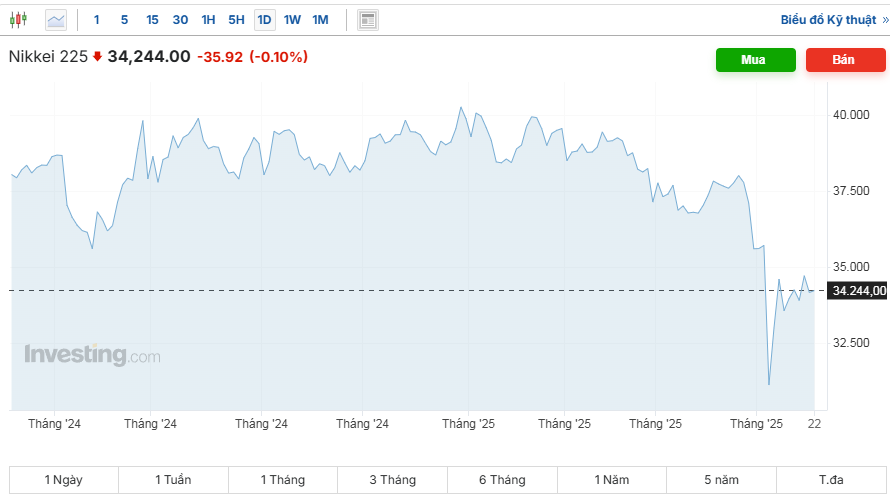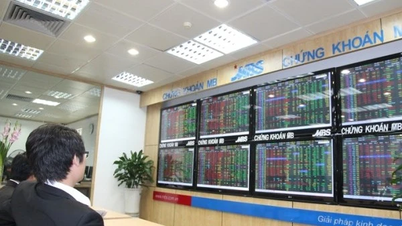 |
US President Donald Trump's repeated criticism of Fed Chairman Jerome Powell for not cutting interest rates sent major US stock indexes down 2% on Monday and sent the dollar to a three-year low.
The sell-off in US assets is “in full swing,” said Tapas Strickland, head of markets economics at NAB. “Whether or not President Trump has the legal capacity and willingness to act against the Fed, the rhetoric underscores the loss of American exceptionalism and the very real policy risks for investors.”
A sharp decline on Wall Street also weighed on investor sentiment in Asia this morning, but selling eased somewhat, allowing S&P 500 futures to rise 0.4% and Nasdaq futures to rise 0.5%.
Japan's Nikkei 225 index also edged down just under 0.1%, while MSCI's broadest index of Asia- Pacific shares outside Japan fell 0.2%. Chinese blue chips were steady.
European shares were less fortunate, however, with futures on the EUROSTOXX 50, FTSE and DAX indexes all down around 0.7%.
The relatively mild decline in Asia has sparked talk that funds may be reallocating money into stocks in the region, although the impact of tariffs on economic growth remains a major drag.
However, according to analysts, the risks ahead are still very large and the selling of US assets is still taking place due to concerns that Mr. Trump's policies could harm US economic growth.
The yield on the 10-year US Treasury note was at 4.40%, rising on concerns that the White House may try to replace Powell with someone more inclined to cut rates, even as inflation improves thanks to Trump's aggressive tariffs. There are also concerns that the current Fed may be more reluctant to ease policy if it is seen as caving to political pressure.
With the White House negotiating various trade deals either ongoing or about to begin, a quick fix seems unlikely. Analysts at JPMorgan note that the average trade deal takes 18 months to negotiate and 45 months to implement. “We reiterate our view that if current policies remain unchanged, there is a 90% chance of a U.S. recession by 2025,” they said in a note.
The loss of confidence in US assets has taken a heavy toll on the dollar, pushing the greenback to its lowest since March 2022 against a basket of currencies, at 97.923 on Monday.
Source: https://thoibaonganhang.vn/chung-khoan-chau-a-giam-nhe-sau-dot-ban-thao-tren-pho-wall-163146.html


![[Photo] President Luong Cuong receives Prime Minister of the Kingdom of Thailand Paetongtarn Shinawatra](https://vphoto.vietnam.vn/thumb/1200x675/vietnam/resource/IMAGE/2025/5/16/52c73b27198a4e12bd6a903d1c218846)



![[Photo] General Secretary To Lam receives Prime Minister of the Kingdom of Thailand Paetongtarn Shinawatra](https://vphoto.vietnam.vn/thumb/1200x675/vietnam/resource/IMAGE/2025/5/16/7f6a2a37f9324e61b3088c464cbc7b16)
![[Photo] Prime Minister Pham Minh Chinh and Prime Minister of the Kingdom of Thailand Paetongtarn Shinawatra attend the Vietnam-Thailand Business Forum 2025](https://vphoto.vietnam.vn/thumb/1200x675/vietnam/resource/IMAGE/2025/5/16/1cdfce54d25c48a68ae6fb9204f2171a)




















![[Photo] The Prime Ministers of Vietnam and Thailand witnessed the signing ceremony of cooperation and exchange of documents.](https://vphoto.vietnam.vn/thumb/1200x675/vietnam/resource/IMAGE/2025/5/16/935407e225f640f9ac97b85d3359c1a5)
































































Comment (0)